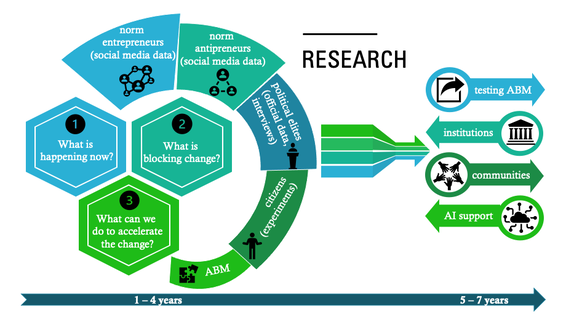
Human-caused climate crisis is undisputable now. In response to this unprecedented challenge the focus is typically on technological solutions and cost-benefit analysis. But sufficient progress will not be made without social change (behavioural and structural change). According to the Climate Change Committee at least 59% of the measures to meet UK’s Net Zero goal require behavioural and societal change.
Research shows that rapid social change can be driven by normative change (what we as society see as morally acceptable).
Currently the driving forces of normative change are climate protest movements. These movement communicate mainly through the Internet, hence my research has a strong focus on social media data analysis. Similarly, the counter-discourse can be observed on the Internet. So again I will use social media analysis to understand the dynamic between the different competing discourses. But to understand to what extent the normative change and the opposing discourse are penetrating political institutions, I will conduct interviews with policy makers on the international, national and local level and look into other data (Hansard Archive, reports, COP Twitter data between 2014 and 2021 to track changes in discourse). A Smartphone-based field-experiment will explore to what extent the normative change can reach individuals and change their behaviour (including voting, etc.) and hence amplify the change. A survey experiment will investigate how psychological blockages can be avoided, that prevent change. All insights will be brought together at the end to create a model of normative change acceleration that can drive wider social change.
Research shows that rapid social change can be driven by normative change (what we as society see as morally acceptable).
Currently the driving forces of normative change are climate protest movements. These movement communicate mainly through the Internet, hence my research has a strong focus on social media data analysis. Similarly, the counter-discourse can be observed on the Internet. So again I will use social media analysis to understand the dynamic between the different competing discourses. But to understand to what extent the normative change and the opposing discourse are penetrating political institutions, I will conduct interviews with policy makers on the international, national and local level and look into other data (Hansard Archive, reports, COP Twitter data between 2014 and 2021 to track changes in discourse). A Smartphone-based field-experiment will explore to what extent the normative change can reach individuals and change their behaviour (including voting, etc.) and hence amplify the change. A survey experiment will investigate how psychological blockages can be avoided, that prevent change. All insights will be brought together at the end to create a model of normative change acceleration that can drive wider social change.